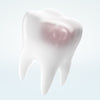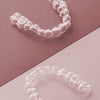Sudden tooth sensitivity can be caused by many factors, including worn tooth enamel. In this article, we’ll explain how the breakdown in enamel can lead to sudden instances of tooth pain and sensitivity, as well as highlighting the main indicators of worn tooth enamel and how to avoid it in the first instance. If you’re wondering ‘why are my teeth sensitive all of a sudden?’ then this article is for you! Although we can offer advice and tips, if you are worried about your tooth enamel, or notice any changes to your teeth, be sure to contact your dentist.
What causes sensitive teeth all of a sudden?
Sudden tooth pain is often a signal from the nerves in your teeth that something is wrong – namely, that their protective layer has been worn away. Tooth enamel is designed to be the protective barrier for your teeth, and so teeth sensitive to hot and cold all of a sudden and sudden tooth sensitivity are key indicators of enamel erosion. For more information about tooth enamel, head to our article on how to take care of tooth enamel.
There are, of course, other possible factors that causes sensitive teeth all of a sudden. These include gum infection, a cracked tooth, and even pregnancy. If you’re worried about sudden tooth sensitivity, the best thing to do is contact your dentist.

How to treat (and avoid) sudden tooth sensitivity
Your tooth enamel faces challenges every day, and so it’s important to maintain good oral hygiene to help keep your enamel strong and healthy and avoid sudden tooth pain and sensitivity.
If you suffer from hypersensitivity, use Regenerate™ Hypersensitivity Toothpaste. When used on a daily basis, it is clinically proven to treat hypersensitivity pain. The patented NR-5+ intensive care formula forms a fresh supply of enamel minerals that wrap and integrate onto teeth, act
ivating a cycle of enamel regeneration with the exact same mineral enamel is made of. As a result, the exposed hypersensitive areas are rescued, and pain signals stop.
Here are a few other tips to avoid (and help treat) tooth sensitivity:
- Switch to a soft-bristled brush and brush gently in a circular motion.
- Don’t rinse with water immediately after brushing your teeth as this can dilute the lasting effects of your toothpaste.
- Avoid highly acidic foods and drinks, such as fruit juice and wine, as they can be damaging to your enamel. We have put together a guide to which ‘healthy’ foods and drinks may be damaging your teeth.
- You may want to avoid very hot or cold food and drink. Some people even prefer drinking hot and cold drinks through a straw so that the liquid avoids direct contact with teeth.
- Floss regularly to remove plaque and reduce gum disease.
If you find that toothpaste for sensitive teeth doesn’t help, you have very sensitive teeth all of a sudden, or you are worried about your oral health, it is always best to consult a dentist.


